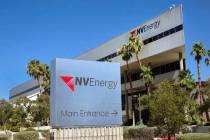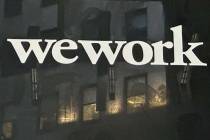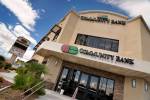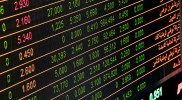Banks charge new fees
NEW YORK -- Free checking as we know it may be ending.
With the exception of some locally based banks, the days when you could walk into a bank branch and open an account with no charges and no strings attached appear to be over. Now you have to jump through some hoops: Keep a high balance, use direct deposit or swipe your debit card several times a month.
One new account at Bank of America charges $8.95 per month if you want to bank with a teller or get a paper statement.
Almost all of the largest U.S. banks are either already making free checking much more difficult to get or expected to do so soon, with fees on even basic banking services.
Bank of America, which does business with half of the households in America and has 55 branches in the Las Vegas area, announced a shift Tuesday in how it does business with customers. One key change: Free checking, a mainstay of American banking in recent years, will be nearly unheard of.
"I've seen more regulation in last 30 months than in last 30 years," said Robert Hammer, CEO of RK Hammer, a bank advisory firm. "The bottom line for banks is shifting enormously, swiftly and deeply, and they're not going to sit by twiddling their thumbs. They're going to change."
Representatives for Wells Fargo Bank and U.S. Bank, two other giant banks serving Southern Nevada, had no immediate comment for the Review-Journal. A Chase Bank spokesman did not return a call for comment.
Spokeswomen at Nevada State Bank and Bank of Nevada, two of the biggest local banks serving Las Vegas, said their institutions continue to offer free checking to consumers.
Individuals with $100 can open a checking account at either bank and pay no local maintenance fees. Bank of Nevada always has offered free checking and has no plans to end it, said Linda Mahan, executive vice president.
Nevada State spokeswoman Sandi Milton said she was unaware of any plans to stop offering free checking accounts.
Banks are charging new checking account fees to make up revenue lost because of new federal laws and rules that limit other fees, said William Uffelman, chief executive officer of the Nevada Bankers Association.
He mentioned caps on fees that merchants pay banks for customers using debit cards and limits on fees for checks that bounce because the customer had insufficient funds in his or her account.
Customers who weren't "handling their business properly" generated fees that previously enabled banks to give other consumers free checking, he said.
"The banks still have a need to remain profitable," Uffelman said. They can only do so by increasing income or reducing costs, he said.
Bank of America CEO Brian Moynihan acknowledged in a conference call that overdraft fees were generating a lot of income.
But the bank was losing customers who often were taken aback by the high hidden fees.
Checking accounts were being closed at an annual rate of 18 percent, he said, and complaints were at an all-time high.
So Moynihan ended overdraft charges on small debit card transactions. He said the rate of account closings since have dropped 27 percent.
To make up for lost fees, he also started thinking of new products.
In August, the bank introduced a new "eBanking" account, in which customers were offered a free checking account if they banked online. The catch: If they opt for paper statements or want access to tellers for basic transactions, they would be charged a monthly fee of $8.95.
"Customers never had free checking accounts," Bank of America spokeswoman Anne Pace said. "They always paid for it in other ways, sometimes with penalty fees. Now they have the option to avoid those fees."
This summer, Bank of America also started offering "emergency cash" for a $35 fee to customers who went to the ATM for withdrawals that would exceed their bank balance. Moynihan said
50 percent of these customers opted to go ahead with the fee.
"We are now in an era where consumers will be buying products from banks, even if it's a checking account," said Brian Riley, senior research director for bank card practice at consultant TowerGroup. He said that several banks have started charging $7.50 for paper statements.
"Paper and print costs around $2.25, add postage to that, and if banks are losing income from other avenues, someone has to pay for it," Riley said.
Economic research firm Moebs Services said free checking usage has been rising steadily in recent years before falling this year. Last year, 81.5 percent of U.S. banking customers had free checking, but that fell to 72.5 percent this year.
Even credit unions are starting to phase out free checking "because it's just gotten too expensive," said Brad Beal, chief executive officer of Nevada Federal Credit Union.
At Nevada Federal, members who already had free checking accounts are being allowed to continue using them free of charge, but the credit union directs new members to its Green Checking product.
Green Checking account holders get statements by e-mail, rather than by regular mail, and they must use their debit card for 12 point-of-sale purchases monthly to avoid fees.
In the past year, lawmakers in Washington have passed new laws aimed at protecting bank customers from harsh fees, like the $35 charged to some Bank of America customers who overdrafted their account by buying something small like a Starbucks latté.
These and other fees were extremely lucrative.
According to financial services firm Sandler O'Neill, they made up
12 percent of Bank of America's revenue. Michael Moebs, the founder of Moebs Services, said it is now up to the smaller Main Street banks to see an opening and grab customers from the big banks.
"Free checking could become a mainstay of community banks and credit unions in the future," Moebs said.
Review-Journal writer John Edwards contributed to this report.























